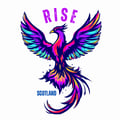About us
Who we are
At RISE Scotland, we envision a world where every survivor of narcissistic abuse is believed, supported, and equipped to heal—free from fear, isolation, and manipulation. A world where awareness breaks the cycle of abuse, and recovery leads to lasting empowerment, safety, and self-worth.
Our mission is to provide survivors of narcissistic abuse with immediate access to emotional support, trauma-informed resources, and safe community spaces—empowering them to heal, rebuild, and reclaim their independence.
We offer specialized support alongside other existing organizations, strengthening the support offered to narcissistic abuse victims and their families.
Our culture and values
Our core values are:
Empowerment
We believe in restoring personal power to survivors by helping them reclaim their voice, identity, and autonomy.
Trauma-Informed Care
We recognize the long-lasting impact of narcissistic abuse and tailor our services to support healing through education, validation, and safe connection.
Respect
We honor each survivor’s unique journey, cultural background, pace of healing, and boundaries.
Justice
We advocate for awareness, accountability, and systemic change to protect survivors and prevent further abuse.
Education
We believe knowledge is power and prioritize public awareness, survivor education, and professional training around narcissistic abuse.
Community
We foster connection, belonging, and mutual support so that no survivor feels alone or misunderstood.
Hope
We believe healing is possible. We support survivors in building meaningful, abuse-free lives.
Our beliefs are:
Healing is not linear.
Recovery from narcissistic abuse takes time, support, and self-compassion.
Going No Contact is a vital step.
This breaks the cycle of manipulation, allows the survivor to heal without interference, and restores their sense of safety and self.
Silence enables abuse.
By raising awareness, we reduce stigma and help others recognize and name the abuse.
Education breaks cycles.
Understanding narcissistic patterns helps survivors avoid re-victimization and rebuild trust in themselves.
Equality, diversity and inclusion policy
At RISE Scotland, we are committed to fostering a culture of equality, diversity, and inclusion in every aspect of our work. We value the unique perspectives, experiences, and contributions that each volunteer brings. Our mission—to support women and children who have experienced narcissistic abuse—demands empathy, integrity, and respect for all.
We recognize that diversity strengthens our organization and enhances our ability to serve a broad range of individuals from varied backgrounds, cultures, and communities.
We believe that:
- Everyone has the right to be treated with dignity and respect.
- Volunteering should be open and accessible to all, regardless of background or identity.
- Discrimination, harassment, and exclusion have no place in our charity.
What We Mean by Equality, Diversity, and Inclusion
-
Equality means ensuring everyone has access to the same opportunities and is not treated unfairly because of who they are.
-
Diversity means recognizing, respecting, and valuing people’s differences—whether related to age, disability, race, religion or belief, socio-economic background, or lived experience.
-
Inclusion means creating an environment where all people feel welcome, valued, safe, and empowered to contribute.
How This Applies to Volunteers
We welcome volunteers from all walks of life and strive to create an environment that:
-
Encourages inclusive recruitment and outreach
-
Supports reasonable adjustments for accessibility or individual needs
-
Challenges discrimination, bias, or stereotyping in any form
-
Reflects the diversity of the communities we serve
-
Promotes an open culture where volunteers feel safe to raise concerns
All volunteers are expected to:
-
Uphold this EDI policy in their conduct
-
Treat fellow volunteers, staff, and service users with respect and fairness
-
Engage in reflective and respectful communication
-
Report any concerns regarding discrimination, exclusion, or harassment




